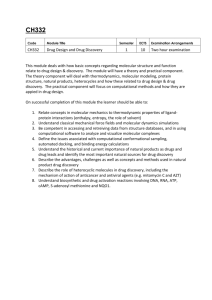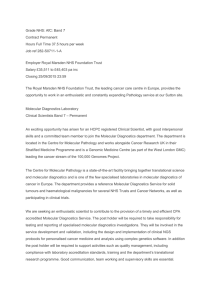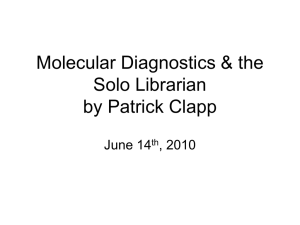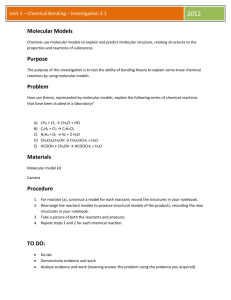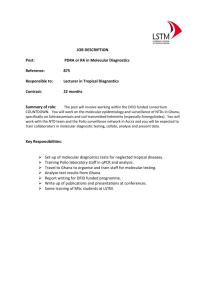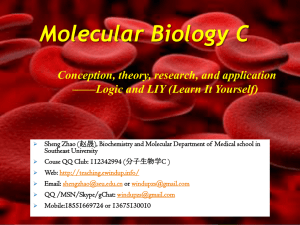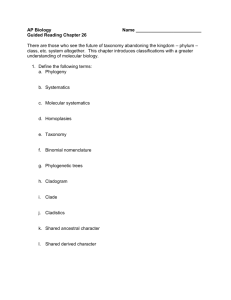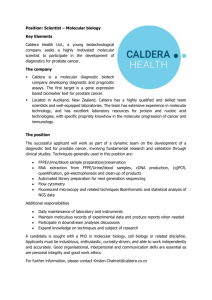Molecular Pathology
advertisement
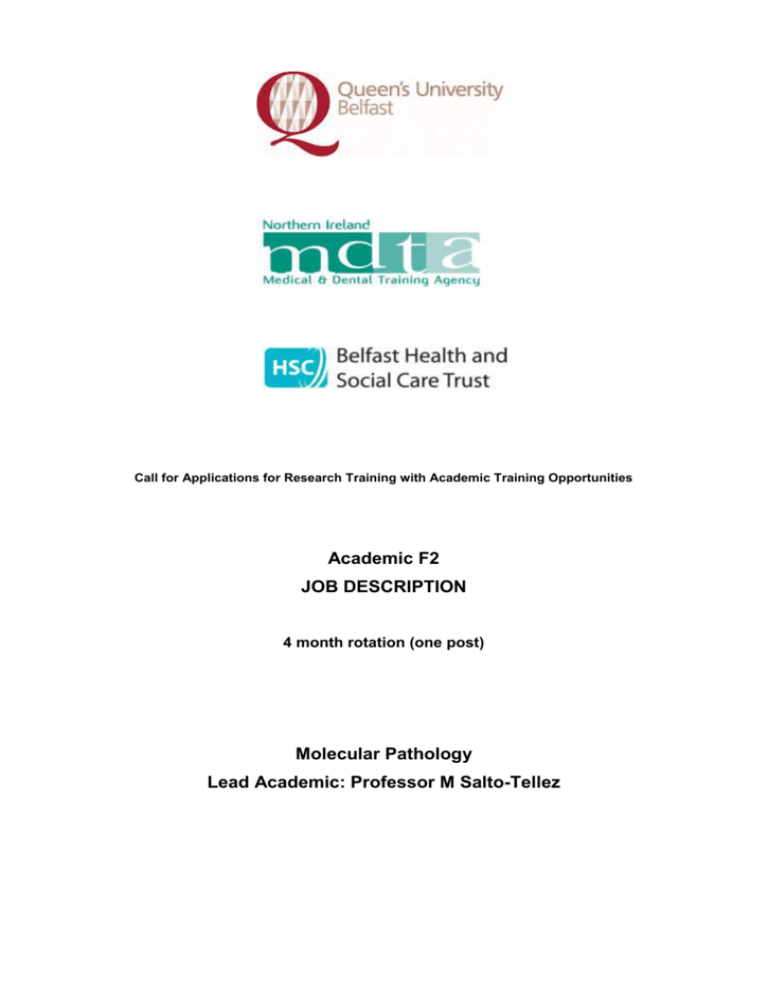
Call for Applications for Research Training with Academic Training Opportunities Academic F2 JOB DESCRIPTION 4 month rotation (one post) Molecular Pathology Lead Academic: Professor M Salto-Tellez Outline of the post Prior to starting the placement Following successful application, you are invited to visit the Northern Ireland – Molecular Pathology Laboratory (NI-MPL) at the earliest opportunity to discuss the forthcoming placement with Academic Clinical Supervisors. This will help with planning a suitable research project and academic experience. Generic academic skills By undertaking an academic F2 placement you will gain insights into clinical academic medicine through regular interactions with the Academic Clinical Supervisors, University scientific staff and postgraduate research students. This placement is designed to develop your knowledge, skills and aptitudes for academic medicine and to foster interest in a long-term clinical academic career. During the 4 month placement Academic component On joining the NI-MPL you will have an initial introductory meeting to review your learning portfolio and agree the educational objectives for this F2 placement. A focused training manual will be provided and you will receive feedback from those supervising you throughout the 4-month attachment with regular assessment to ensure academic competencies are achieved. Research skills 1. A research project can be chosen in one of a number of topics relevant to molecular diagnostics and personalised medicine of cancer. These include areas such as analysis of biomarkers for diagnostic and therapeutic purposes, clinical relevance of bench discoveries, or application of Next Generation Sequencing technologies in modern medicine. Ideally, the research project could form the basis of an abstract to be submitted to a national or international meeting 2. Research training: With guidance it is envisaged you will be able to complete a number of research project tasks (learn about the research governance issues relevant to clinical academic research; undertake a literature review; interrogate a database; collate biochemical and/or genetic results; practise scientific writing; presentation of data in an abstract, as a poster and/or oral presentation). To assist in this we have planned for academic F2 doctors to visit associated laboratories and research areas with links to molecular pathology (specifically molecular genetics, histopathology, clinical trials unit and epidemiology, among others). 3. Mentorship: You will have access to experienced clinical academic staff (Professor Salto-Tellez and Dr J James) who are available to provide longer term advice and encouragement to help you pursue a career in academic medicine Teaching skills Pathology has active undergraduate and postgraduate educational opportunities. 1. You will be encouraged to participate in the undergraduate teaching of Pathology to 2nd year medical students (tutorials). This teaching will be directly observed by your academic supervisors with multiple opportunities for feedback to improve your confidence and competence. 2. Formal postgraduate education includes weekly meetings at the NI-MPL and the Centre for Cancer Research and Cell Biology. Clinical component There will be F2-level clinical feedback, appraisal and assessment as documented in the Foundation Programme Curriculum (www.mmc.nhs.uk). You will have particular opportunities to expand your knowledge of conventional and molecular diagnostics by co-analysing cases that will be diagnosed at the NI-MPL during that period. Tuition will also be provided on appropriate construction of dictated reports to fellow health professional on patients (an important generic skill). It will also be expected that this activity could prepare you for a future specialty training in Pathology, should you wish to follow that path. Provisional job plan This job plan has been designed to introduce the successful candidate to major areas of clinical and academic pathology. There will be access to a desk and a computer for use in the NI-MPL. Training in library and journal access will be provided in addition to the clinical training on the relevant hospital IT systems pertinent to pathology practice. a.m. MON TUES WED THURS FRI Weekly review of progress Molecular Diagnostic Training Session Project Molecular Diagnostic Training Session Project work and CPD: Molecular Diagnostic Training Session p.m. Project Molecular Diagnostics Report Preparation for Mutation Tests Molecular Diagnostics Weekly Business meeting Biomarker Validation Meeting Molecular Diagnostic Report Authorisations Molecular Diagnostic Training Session Specialist element Molecular Diagnostic Session -Reporting DDISH Weekly seminar Molecular Diagnostic Report Authorisations Project Molecular Diagnostics Report Preparation for Mutation Tests Annotations for Molecular Diagnostics Molecular Diagnostics Report Preparation for Mutation Tests Annotations for Molecular Diagnostics Project CCT ACADEMIC TRAINING PATH Medical School MB Intercalated BSc, MSc, MRes BSc MB/PhD Foundation Programme Academic Foundation Year ST1, ST2, ST3 Specialist Training Core Medical Training Academic Status Clinical Training F1 Academic position Academic Clinical Fellowship Academic Clinical Lectureship ACF ACL 1 2 3 4 Senior Lecturer 5 F2 Personal Fellowship Training Fellowship 3 yrs Clinician Scientist Fellowship or Educational Training up to 4 yrs Further specialty / sub-speciality training Senior Clinical Fellowship Graduate Entry Training The timings of personal fellowships are indicative – there should be flexibility according to individual career progression Academic F2: Academic F2 training posts are for 4 months. ACF/ACL: Trainees already appointed at ST3 or above are eligible to apply. Trainees who have undertaken postgraduate research (PhD or MD) should have already submitted their thesis, or be within three months of submission. August 2014
